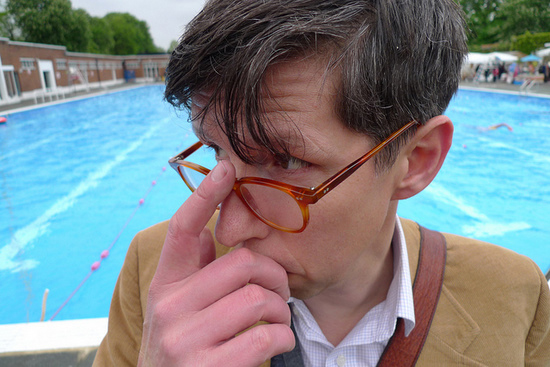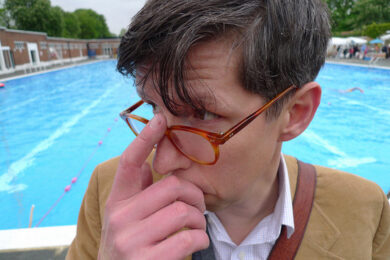Super Swimming Stadium by Darren Hayman from Darren Hayman on Vimeo.
With the Olympics just seven days away, it’s good to be reminded that the pursuit of health through exercise doesn’t have to be a grim contradiction of fast food, corporate dictatorship, and plasticated superhumans going round and round in circles.
Darren Hayman’s latest project, then, is well timed. Lido is a limited edition album that reflects on the outdoor swimming pools that were once a significant part of British communal exercise, but have fallen on hard times in recent years, with many closing. Lido, is a completely instrumental album, and therefore something of a departure for Hayman, who we’re most accustomed to hearing send forth his eloquent lyricism about the shabbier end of life, and things lost.
Lino is available on limited edition vinyl via Where It’s At Is Where You Are records and on CD by Clay Pipe Music. You can do that here. We spoke to Darren about Lido:
Can you tell us about the lido project and how it came about?
Darren Hayman: I find myself listening to more and more instrumental music as I get older. Which is slightly problematic as I am known primarily for my lyrics. For the last three or four albums I have made instrumentals which for whatever reason haven’t made the final list. They’ve always felt very important and integral to what I do and the pile of ones that sounded really good to me just grew. Me and my friend Dave S were talking about how instrumental music could be about something specific as much as any lyrics. The tunes gradually came to be about summer, clear water, municipal buildings and faded glory.
Was it a challenge making an instrumental album rather than one using lyrics and voice?
DH: It’s easier. Which isn’t to say that in itself it was an easy project but I create tunes all the time. It’s like a nervous habit. There’s hundreds on the voice notes in my phone. I’m not boasting. I’m sure many would think they’re not very good, but it’s creating a lyrical world that really takes the hard work. This album was a pleasure to make.
Why did you choose to make an instrumental record? Did it feel especially appropriate for the subject matter?
DH: A third of it was made without the title or the theme. There was just a general summer vibe. After I decided the theme it became more interesting. I started to think about what water music could be. How music might sound underwater. Also the decision to tackle closed or destroyed lidos was interesting. To make music about the absence of things.
What is your first memory of a lido?
DH; I’ve thought about this a lot. I have such a dim and distant memory of Brentwood Lido in my hometown. My mother wrapping a towel around me. Such a hazy, distant, blurred image. It closed in 1976 so the oldest I could have been was five or something. I went back to the site to make sound recordings and there was a faint echo of the place in the stretch of grass that covered. I recorded, literally, the absence of it and buried it in the recording.
How did the different lidos inspire you?
DH: The ones that are open and that I use were all joyous uplifting tunes. I felt of water and sun. Being immersed in water calms me. The music had to clam. The closed or abandoned ones became essays on memory and lost, bold, civic dreams.
Do you feel optimistic about the future of lidos?
DH: Well to look at what there was so many have gone. Although i do feel the London ones now have good support and will stick around for a while.
Do you take a lido constitutional? and if so, what exercise regime would you recommend to Quietus readers?
DH: Being a man of relative leisure, at least not working the nine to five, I actually stop using the Lidos in the summer holidays, too busy. Spring and Autumn are Lido weather. I don’t really exercise, as anyone can see from my figure. It’s not about that. It’s about the calming feeling of being surrounded by water. Especially in the city. At the Oasis lido in central london you look up and see the tower blocks. It’s so weird. But lovely.



